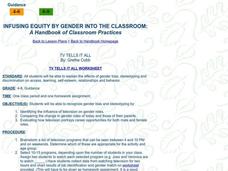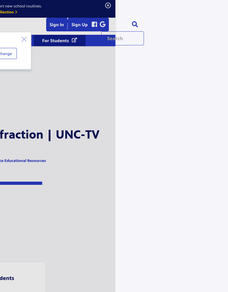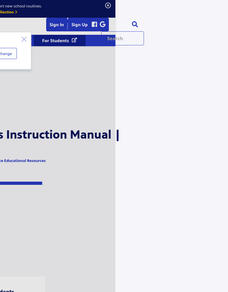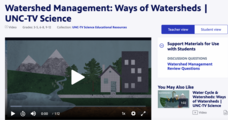Curated OER
TV TELLS IT ALL
Pupils identify the influence of television on gender roles and talk about how they are changing.
Curated OER
TV Viewing
Students test a hypothesis to see if there is a direct correlation between number of hours of TV viewing and academic grade. They collect and compile data to enter on a spreadsheet and create a word processing document supporting their...
Curated OER
ISLA for Theater, TV and Film
Students examine the use of the Information System for Los Angeles to research a period of theater, TV or film. They research either a wardrobe period or a set/scene design and present their findings to the class.
Curated OER
The Link With TV and Vegetables
Fourth graders explore Philo Farnsworth, a fourteen year old farm boy in 1921, who thought up the idea of television. By the time he was in a high school physics class he drew his concept.
Alabama Learning Exchange
Food Guide Pyramid - TV and Peers
Students identify foods that belong in each group on the food guide pyramid. They discuss how TV and peers may negatively influence eating habits.
Education World
Every-Day Edit: Arthur and His TV Friends
For this everyday editing worksheet, learners correct grammatical mistakes in a short paragraph about the television character Arthur. The errors range from capitalization, grammar, spelling, and punctuation.
Media Awareness Network
Images of Learning: Elementary
Tired of 20-somethings portraying high school students? Tired of athletes and principals always being the villains? Class members examine the student and teacher stereotypes presented TV shows and films that are et in schools.
Curated OER
The 1950s:
Teens will get a kick out of this presentation, which provides a glimpse of the consumerism and rising pop culture of 1950's America. They will especially appreciate the discussion of "Teen culture" including the music of Elvis, the...
National Council for the Social Studies
Analyzing a Product or Political Advertisement
How do advertisements evoke specific thoughts and feelings? Class members find out through the exploration of the Internet, videos, television, magazines, radio, and posters. Learners investigate commercial advertisements, political...
PBS
The Water Cycle: Ways of Watersheds | UNC-TV
Explore water on Earth without getting wet using a short animated activity. Scientists learn how water interacts with the land, the importance of watersheds, and relevant vocabulary as they watch an informative and engaging video....
PBS
Water Cycle and Watersheds: Ways of Watersheds | UNC-TV Science
Take a field trip with water as it moves on and below Earth's surface. Investigators discover the link between water and land in the water cycle and the importance of watersheds while viewing an animated video. Scholars test their...
DocsTeach
Challenger Explosion Photograph Analysis
Young historians turn into detectives in a thought-provoking activity on the Challenger Explosion. The activity uses an image of President Reagan watching the Challenger explode on live TV to help academics practice historical analysis....
PBS
Reflection and Refraction | UNC-TV Science
Uncover the exciting interactions of light energy and matter ranging from color to optical illusions. Participants explore color using red and green apples, differences between reflection and refraction, and descriptions of related...
PBS
What's the Matter? | UNC-TV Science
Explore what makes up the universe and demystify the complex ideas of matter and the atom. Group members watch a video with explanations, animations, and examples that discuss the characteristics and importance of matter. Scholars then...
PBS
Genes 101: Life’s Instruction Manual | UNC-TV Science
Discover the common genetic ground shared by humans and chickens. Group members listen and view an animation about genes and proteins, which details their roles in building biological structures such as tissues and organs. Participants...
PBS
Genome 101: Life's Instruction Manual | UNC-TV Science
Crack open the mysteries inside a genome. Participants view an animated video describing the relationship between DNA, genes, proteins, chromosomes, and an organism's genome. A post-video learning exercise allows pupils to apply...
PBS
Volume and Amplitude | UNC-TV Science
Future physicists pump up the volume while discovering the world of sound waves. Group members learn about the qualities of sound waves, the relationship between energy and sound volume, and the definition of amplitude while viewing an...
PBS
Categorizing Matter | UNC-TV Science
Take the difficulty out of classifying matter with an easy-to-follow activity that makes distinguishing between pure substances and mixtures simple. Scholars explore how matter is grouped between two categories—pure substances and...
PBS
Watershed Management: Ways of Watersheds | UNC-TV Science
Inspire young conservationists to protect the environment with a short activity on water quality and watersheds. Participants discover the importance of watershed management, learn about water quality problems, and discover possible...
PBS
The 3 Phases | Phases of Matter | UNC-TV Science
Explore the states of matter without the mess or expensive equipment in a compact, informative activity. Scientists watch as the narrator explains the three states of matter using a glass of ice and soda in an animated video that...
PBS
Phase Changes | Phases of Matter | UNC-TV Science
Take an energetic ride through the phase changes of a water molecule in a compact activity. Young scientists learn about the phases of matter and discover the role of thermal energy in governing phase changes while watching a short...
PBS
Convection: Heat Transfer | UNC-TV Science
Learn why what goes up must come down in both air and liquids. Investigators discover how convection transfers thermal energy and the movement of particles in liquids and gases due to density differences by viewing an animated video....
PBS
Thermal Energy 101: Heat Transfer | UNC-TV Science
Discover what makes a cup of tea feel hot one minute and cold the next. Young physicists learn about thermal energy, why substances feel hot or cold, and the three means of thermal energy transfer: conduction, convection, and radiation...
PBS
Thermal Radiation: Heat Transfer | UNC-TV Science
What do people, campfires, and microwaves have in common? Investigators explore heat transfer by thermal radiation, discover the role of electromagnetic waves, and see examples of radiation while viewing a video. Scholars challenge their...
Other popular searches
- Educational Television
- Television Cartoons
- Evaluating Television Content
- Crime Drama Television
- Images on Television
- Television and Film
- Television Broadcasting
- Television Commercials
- Westerns Movies Television
- History of Television
- Film and Television Production
- Pop Music on Television

























